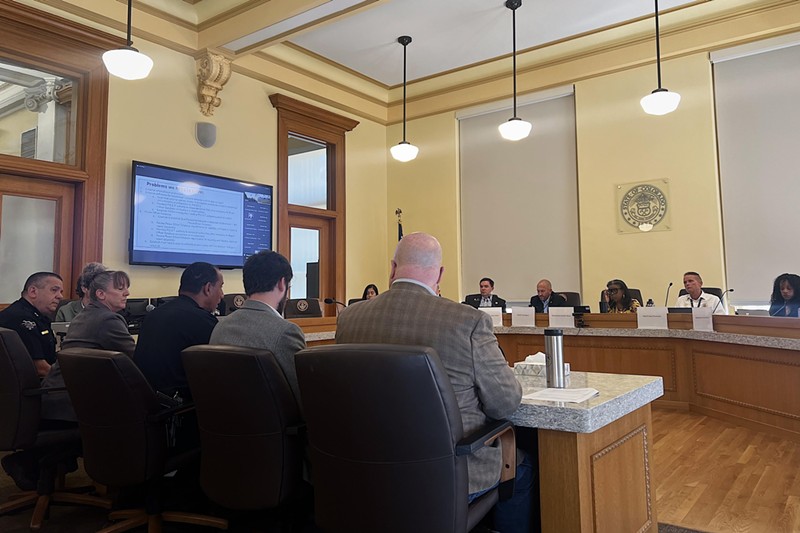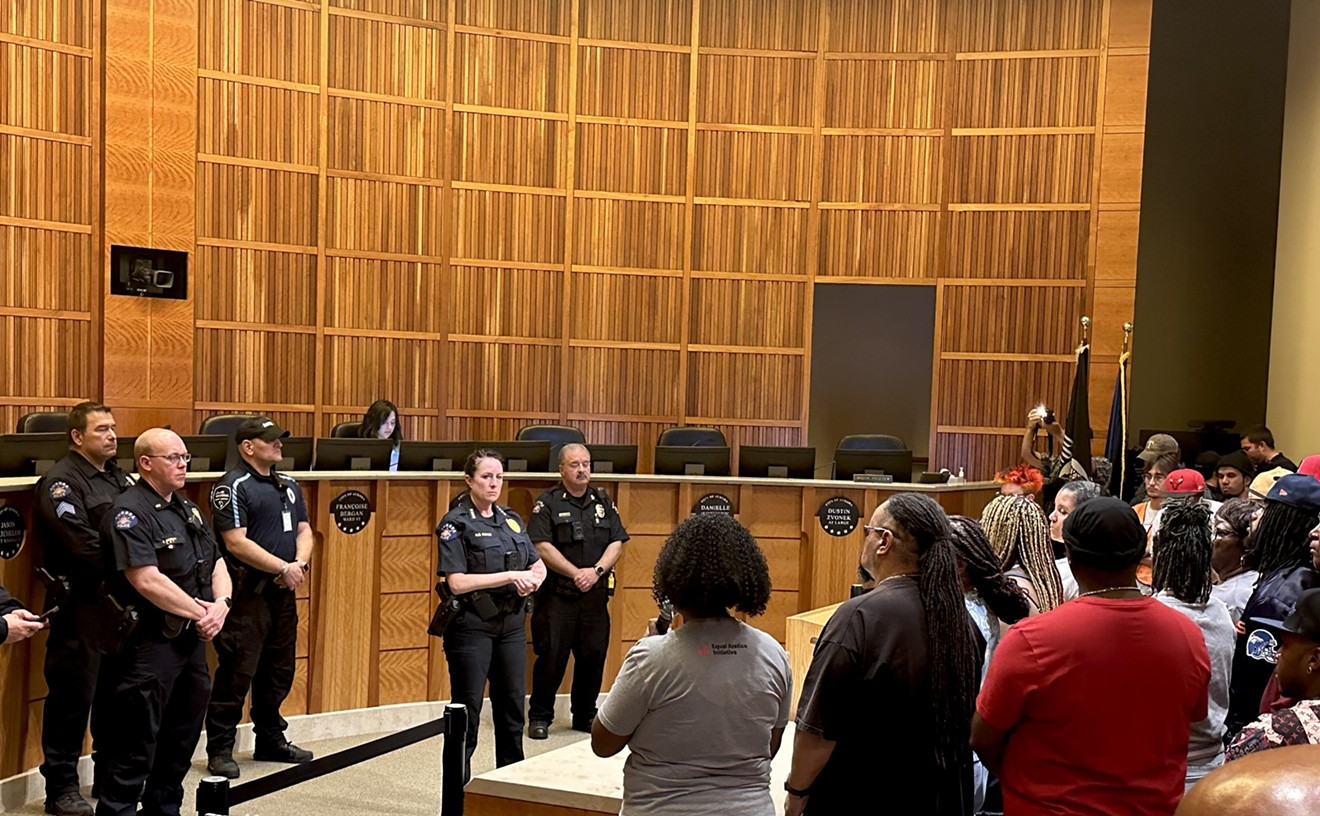More than four years later, the perpetrator, Nathan Geerdes, pleaded guilty to Rees's assault. He was sentenced in April to four years' probation, made to register as a sex offender and barred from working in law enforcement. Last month, Rees was granted a $575,000 settlement from the City of Edgewater after suing for discrimination.
But like her attacker, Rees still cannot work in law enforcement in Colorado.
As a result of the assault and subsequent investigation, Rees was added to the state's Peace Officer Standards and Training (POST) database — essentially a database for bad cops. Rees has two entries in the database, marking her for resigning "while under investigation" and for "dishonesty" in her initially disbelieved assault report, which makes her ineligible for peace officer certification.
Now, Rees is working with state legislators to better protect whistleblowers when they report misconduct by their fellow police officers.
"We want to create change," Rees says. "Not every problem is going to be solved. But if we can at least swing the pendulum a little bit toward the right direction, then I'll feel accomplished and we, all of us who have gone through this, can move on from what has happened to us."
In May, a legislative effort that would've created some of those protections was rejected by state House representatives by only two votes. That measure, House Bill 24-1460, sought to legally mandate that law enforcement officers report misconduct of other officers, as well as require agencies to investigate allegations and prohibit retaliation against officers who file complaints. An amended version of the bill also aimed to let officers who were retaliated against remove their names from the POST database.
That bill received major pushback from law enforcement groups over various concerns, including unclear definitions of "misconduct" and rushed negotiations. The measure was introduced with only three weeks remaining in the 2024 legislative session, but this time around, lawmakers are starting work on the 2025 bill early.
Three legislators and a host of law enforcement representatives met on Thursday, July 18, to discuss a new version of the bill to protect police whistleblowers. They plan to finalize a draft in December before lawmakers reconvene for the 2025 legislative session.
"It's wishful thinking, but we would like to bring this in with as little fanfare as possible in January," Representative Chad Clifford said during Thursday's meeting.
Retaliation Against Whistleblowers
Rees shared her story on Thursday in front of a room full of police chiefs, sheriffs, politicians and lobbyists to highlight what issues the proposed legislation will address.Rees was a 25-year-old rookie when Geerdes first sexually assaulted her in an Uber after a department Christmas party. Shortly after, in a restaurant they had gone to to meet other coworkers, he assaulted her again. An investigation later revealed that Geerdes had assaulted multiple victims and allegations of sexual harassment dated back to at least 2014.
"I'm no longer a police officer, but I'm still here fighting every day for everybody that still is a police officer," Rees said during the meeting. "I believe in the career and I believe in equality for everybody, so I'm going to continue to fight until we get the results that we want so that everybody has an equitable workplace."
In addition to Rees, more than twenty other whistleblowers from law enforcement agencies across Colorado have helped work on the legislative proposals, proponents say.
The anonymous experiences of other whistleblowers were read aloud at the meeting. In one, a police officer who reported a sexual assault between another officer and their superior was the subject of harassment and frivolous complaints until they were eventually put on administrative leave.
Another account detailed a sergeant who multiple officers reported for regularly engaging in "ghost pursuits," where they chase vehicles in an unmarked patrol car while sometimes not using emergency equipment. Though they say the sergeant's actions have resulted in damages and injuries several times, the chief decided not to conduct an investigation or impose discipline, allowing the behavior to continue to this day.
Stephanie Silverman, a former Colorado Springs police officer, told her story in person. In 2022, using the last name Landreneau at the time, Silverman made headlines when she was arrested on felony stalking charges and accused of using department resources to track her estranged husband, who was also a cop.
But Silverman said she was "unjustly" arrested for viewing body camera footage of her then-husband "having an on-duty affair." Silverman says she reported the incident to her supervisor, but she was arrested one month later. The charges were quickly downgraded from a fifth-degree felony to a misdemeanor and a petty offense, according to media reports at the time. Silverman says all of the charges were dropped within weeks.
Afterward, Silverman was "basically bullied into medically retiring," she explained in May while advocating for House Bill 24-1460.
"I'm just trying to make sure that no one ends up in the same place that we were put in," Silverman said Thursday.
Proposed Solutions
Representatives Clifford, Leslie Herod and Jennifer Bacon (the latter two of whom sponsored House Bill 24-1460) were at Thursday's meeting. In drafting the new bill, legislators said they want to make the state's whistleblower statute less broad.Pre-written goals for the bill include strengthening whistleblower protections; clarifying the definitions of misconduct, unlawful behavior and the duty to report; adjusting due process, reporting and review requirements for the POST database; and establishing whether the state needs to expand uniformity and consistency with how body camera footage is released.
"The people who keep us safe should feel safe at work, especially if they just want to do the right thing and report misconduct,” Bacon said.
Representatives for the POST database also shared ideas. Erik Bourgerie, director of POST, said they have a process for removing an officer from the database if "new evidence was presented," but POST lacks access to agency files to evaluate appeals cases. For example, they cannot view internal affairs documents that may prove an officer was a whistleblower, which resulted in them being added to the database. In addition, he said it is legally unclear whether POST or district attorneys have the power to remove officers from the database.
"We're at an information disadvantage," Bourgerie said, requesting that the new bill address these problems. "The way the law is written, we don't know. It's been a matter of debate with our counsel, and I can't say that we've landed on a solid answer."
Rees emphasized that the process is unclear to officers, too. She said she had to hire an attorney to try to appeal her POST reports, and still was told she needed to take the issue to district court.
"I don't think it's clear to any peace officer how to go about the process at all. I don't think there's any education that has been given to line-level officers," Rees said during the meeting. "Nobody has, I feel, been educated on the due process of POST."
Around a dozen police chiefs and sheriffs from across the state attended the meeting, in addition to various state public safety officials and advocates. Some law enforcement officials suggested that more education for police officers is needed.
"If you feel like some of the things that are happening to you are because you're a whistleblower, there's not really a highlighted process for which you can come forward," Denver Police Chief Ron Thomas said.
Todd Reeves, deputy chief of the Arvada Police Department, questioned whether statewide legislative action is necessary to address the issue.
"I do wonder, are we trying to solve a problem universally for a few organizations that don't have good, solid practices in place or things that do protect their employees?" Reeves said. "Should we pause and find out where there are gaps in the actual processes with some of the agencies where this has come forward...instead of trying to throw the baby out with the bath water?"
"We're going to find all of those things out in this process," Clifford responded. "We have to look at how we ensure that it doesn't happen. That we don't have an area of law that says, 'Okay, some people are going to fall through the cracks.'"
The group also discussed consequences for law enforcement agencies that fail to report officers to the POST database. Bourgerie said POST can levy fines, though they haven't issued any. Herod suggested that another body could be made responsible for levying fines to avoid conflicts, since POST works closely with law enforcement agencies.
Next Legislative Steps
Legislators plan to meet with law enforcement and public safety officials every month through the end of the year, with small groups assigned to work on specific topics. They are set to start drafting the bill in November and finalize it in December.All of the meetings, including for the working groups, will be open to the public, they say.
"We should seize the opportunity to be able to flesh out the issues, spend the time to be able to build some really solid policy," Bacon said. "Maybe we will not solve [these problems] for all of America in six months, but it is important for us to have those conversations."
Colorado's 2025 legislative session will begin on January 8.












